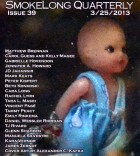The first thing that struck me about this story is that it’s sad without being sentimental. Did you struggle to find that perfect tonal balance?
Thanks, Josh. I’m very interested in this discussion of sentimental writing and why that’s ostensibly a bad thing. I think what I try to avoid is emotion that seems unsubstantiated or dramatized—torqued feeling that seems almost unbelievable or inaccessible. I try to avoid glibness or “unearned” feeling and revise fervently. This story came out very easily, as I recall.
The impending death of the narrator’s mother hangs heavy over the proceedings, but we are only given clues as to their relationship. The most telling is in that moment where he admits that the only reason he has remained on the beach is to see the bones “found, lifted, bagged, gone.” Do you think the narrator feels a similar obligation to his mother who is almost dead from cancer but hasn’t passed away yet?
I think the narrator feels that obligation. But I don’t think that’s the only reason he stays on the beach.
I love the image of the handprint disappearing. Did you always know that was how the story would end?
I really had no idea until I came to it. I tend to find myself closing my eyes every paragraph or so and trying to deeply imagine the world of the story, sort of recalculating to keep up with the place and interior world of the people about which I’m writing. And that image, which seemed quiet and true, resonates for me in ways other endings didn’t.
Why do you think he doesn’t admit to touching the ribcage?
The narrator’s pretty clearly lying, which I hoped would speak to him a bit, to how he works. That someone would lie about such a thing seems to suggest, for me, a person who copes in particular, interesting ways. The lie seems so clearly the wrong response to me, too, and that’s what initially pulled me into the piece: the question of this ribcage’s possible significance in the narrator’s life, his desire to distance himself from it.
I think the length of this piece is about perfect. Do you always work in such a short form? Do you have any upcoming projects you can talk about?
I started working in short-short form because I think short fiction is—as one of my favorite writers, Jennifer Egan, has said—a kind of “study in compression.” And this view of short fiction (not just short-short fiction) has really informed how I write. There’s a merging of economy of fact and musicality of language that I aspire to (and that model for writing fiction just downright interests me for the inherent challenge it provides). But I’m always trying on a broader level to aim for the heart, for something that lands heavily and feels like an accurate, humane portrait of the way I know life to be. I’m working on longer stories now, which I’ve enjoyed, and am currently in the process of revising several before sending them out into the world.



 The SmokeLong Grand Micro Contest (The Mikey) is now an annual competition celebrating and compensating the best micro fiction and nonfiction online.
The SmokeLong Grand Micro Contest (The Mikey) is now an annual competition celebrating and compensating the best micro fiction and nonfiction online.